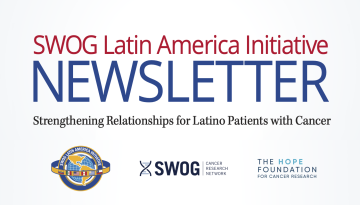Durable IO therapy responses in angiosarcoma
In a small study of 16 patients with the rare cancer angiosarcoma, tumors in four patients partially or completely responded to treatment with a combination of the immunotherapy drugs ipilimumab and nivolumab. Another two patients maintained stable disease on the drug combination. In some cases responses to treatment have been sustained for longer than one year, and at least one patient had their tumors disappear entirely.
The work was done by researchers with the SWOG Cancer Research Network, a cancer clinical trials group funded by the National Cancer Institute (NCI), part of the National Institutes of Health (NIH). The results are published in the Journal for ImmunoTherapy of Cancer.
The study was led by Michael Wagner, MD, of the Fred Hutchinson Cancer Research Center and the University of Washington. “Angiosarcoma is a rare cancer that has few effective therapy options that benefit patients for a long time,” Wagner says. “If there’s a subset of patients – and it seems like there are – who will have a durable response with immunotherapy, these patients would hopefully live longer and have a good quality of life.”
With only about 400 new cases reported in the U.S. each year, angiosarcoma is an ultrarare tumor that usually develops in the skin and tends to be highly aggressive. Once it has metastasized, it is typically treated with chemotherapy, but the cancer’s response to that treatment is usually not long-lasting and angiosarcoma has a high mortality rate. Isolated reports of angiosarcoma tumors responding to immunotherapy have come out of other clinical trials, but this work represents the first prospective trial of immunotherapy in the disease.
The work was done as part of the innovative DART (Dual Anti-CTLA-4 & Anti-PD-1 blockade in Rare Tumors) trial, a federally funded “basket” trial that tests the combination of ipilimumab and nivolumab against a wide range of rare cancers. These study drugs, known as immune checkpoint inhibitors, are provided through a Cooperative Research and Development Agreement between the NCI and Bristol-Meyers Squibb, the maker of both drugs.
Through DART, this drug combination has been tested in 53 cohorts of rare cancer patients, with testing still underway in 10 of those cohorts. Other rare cancers that have been treated with some success in the trial include thyroid tumors, metaplastic breast cancer, and neuroendocrine tumors. The trial has enrolled 773 patients thus far and is approaching its ultimate goal of 818 patients. The DART trial is sponsored by the NCI, led by SWOG, and conducted by the NIH-funded National Clinical Trials Network (NCTN).
“Outside of DART, the angiosarcoma study probably would have taken years to get going,” Wagner says. “Adding it to DART helped expedite getting these results.”
Wagner’s team treated 16 eligible patients with the immunotherapy combination. Six saw their tumors shrink at least somewhat – three of these patients met the criteria to be called a partial response to treatment, and one met the criteria for a complete response. Two additional patients had tumors that were stable after starting treatment. These two patients still remain on treatment with stable disease. Among the five patients on the trial with primary cutaneous disease of the face or scalp, three (60 percent) improved with treatment. This is a subset of patients who face particularly bleak odds with current treatments.
Patients on immune checkpoint inhibitors often experience side effects, and treatment toxicity in this group of patients was comparable to the toxicity seen in other trials with the ipilimumab and nivolumab combination in sarcoma. Among these patients, 75 percent reported treatment-related adverse events (side effects), and 25 percent reported treatment-related adverse events of grade 3 or greater.
###
This work was supported by NIH/NCI grant awards CA180888, CA180819, and CA180868, and in part by Bristol-Myers Squibb Company.
Collaborators on this work included Megan Othus, PhD, of the SWOG Statistical and Data Management Center; Sandip P. Patel, MD, of the UCSD Moores Cancer Center; Chris Ryan, MD, of Oregon Health & Science University; Ashish Sangal, MD, of Western Regional Medical Center; Benjamin Powers, MD, of the University of Kansas Medical Center; George T. Budd, MD, of Cleveland Clinic; Adrienne I. Victor, MD, MS, of University of Rochester; Chung-Tsen Hsueh, MD, of Loma Linda University; Rashmi Chugh, MD, of University of Michigan; Suresh Nair, MD, of Lehigh Valley Health Network; Kirsten M. Leu, MD, of Nebraska Methodist Health System; Mark Agulnik, MD, of City of Hope National Medical Center; Elad Sharon, MD, MPH, of the NCI’s Cancer Therapy Evaluation Program; Edward Mayerson, MS, of the SWOG Statistical and Data Management Center at Fred Hutchinson Cancer Research Center; Melissa Plets, MS, of the SWOG Statistical and Data Management Center at Fred Hutchinson Cancer Research Center; Charles Blanke, MD, of SWOG Cancer Research Network and Oregon Health & Science University; Howard Streicher, MD, of the NCI’s Cancer Therapy Evaluation Program; Young Kwang Chae, MD, MPH, of Northwestern University; and Razelle Kurzrock, MD, of UCSD Moores Cancer Center.
Other Recent Stories



